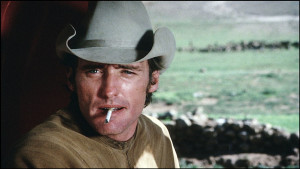 Review: One Afternoon Only
Review: One Afternoon Only
The Last Movie | Dennis Hopper | USA | 1971 | 108 min
UW Cinematheque, Chazen Museum of Art, Sunday, March 8, 2:00pm»
Editor’s Note: The UW Cinematheque kicks off its series of films released by Universal Studios in 1971 with Dennis Hopper’s The Last Movie. The Cinematheque website explains the premise for the series: “Universal Pictures released a slate of high quality original productions with low-to-medium budgets that, collectively, went unmatched by any other studio’s annual lineup during the early 1970s. . .While critically acclaimed, few of the Universal ‘71 releases found wide acceptance from audiences at the time of their original release, though their reputation among cinephiles has grown steadily over the subsequent five decades.”
Dennis Hopper’s second feature, The Last Movie, certainly fits this description. Following up on his breakthrough hit, Easy Rider, Hopper was given a large degree of creative control and went to Peru to film his pet project. –J.K.
The idea of The Last Movie really appealed to me. After a Hollywood western is shot on location in a very small Peruvian village, the Peruvians mimic the filmmaking process but they don’t seem to understand that stunts in films are fake. Horse wrangler Kansas (Dennis Hopper) remains in Peru in anticipation of more film work. He hooks up with a local prostitute, Maria, and his life seemingly reflects a paradise filled with riches, women and alcohol. The premise of Americans having a negative influence on a foreign country perhaps reflects the Vietnam war at the time. However, in this case the film industry, not the military, brings violence. The idea appealed to me because I genuinely wanted to see how this scenario might play out.
One night Kansas drags Maria along on a drunken party with a group of Americans, including Harry Anderson (Roy Engel), who made his fortune with a local broom factory. They go from place to place drinking and arrange for a “circus” of sex act performances at the local brothel. Kansas is more interested in Mrs. Anderson (Julie Adams), which prompts a jealous response from Maria. I cringed during the awkward sex scenes, the awkward drunken partying and the ignorant conversations about money. What I took from most of the film was that, the Americans viewed the Peruvians as dumb and gullible, and the Peruvians viewed the Americans similarly. Perhaps Hopper portrayed Americans so negatively because of their long involvement with Vietnam war. But the Peruvians were portrayed negatively as well, especially through their immediate obsession with rich, material things that were introduced to them. Maria clung to a fur coat while standing in a house without electricity.
After he beats Maria in anger, Kansas’ confidence becomes shaken and he seems confused by what he is doing and what he should do. When the locals start “filming” their own movie, they cast Kansas as the gringo who gets killed. From here,The Last Movie becomes extremely experimental and challenges basic expectations for a studio-released film.
Though the concept and themes were intriguing, I did not enjoy the film until about an hour in. Like many of those going to see it in 1971, I was expecting a film similar to Easy Rider. Though The Last Movie did incorporate similar ’60s soundtrack and satire on human ruthlessness, it was a lot harder to get into. I found it difficult to relate to Kansas and therefore he became an unsympathetic wild card. I had no idea what he was going to do, but he seemed destructive.
The film opens with the shooting of a Western. The scenes filmed are mainly of a shootout and eventually, without much buildup, an actor is killed in a stunt. But this material was not very engaging. The beautiful landscapes kept distracting me so for most of the film I was confused about what was going on.
Surprisingly, it wasn’t until the plot became loose and incoherent that my interest was really sustained. Once the Peruvian “filming” starts, and once Kansas gets shot while trying to escape, the stylistic aspects of The Last Movie start to override any story. The perspective becomes highly subjective and the scenes are repeated, slowed down, and any temporal continuity vanishes.
The Last Movie contrasts with conventional cinema by challenging the viewer. The film doesn’t provide a lot of exposition, barely focuses on a logical plot, and portrays life very negatively. Hopper seems to have a poor view of American cultural and economic imperialism, and perhaps these feelings were the driving force behind this film. Though difficult to watch at the time, I kept thinking about the film the day after. My best advice is to take watching the film as an experience in itself.